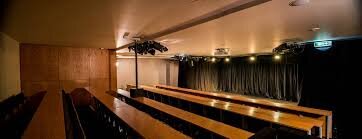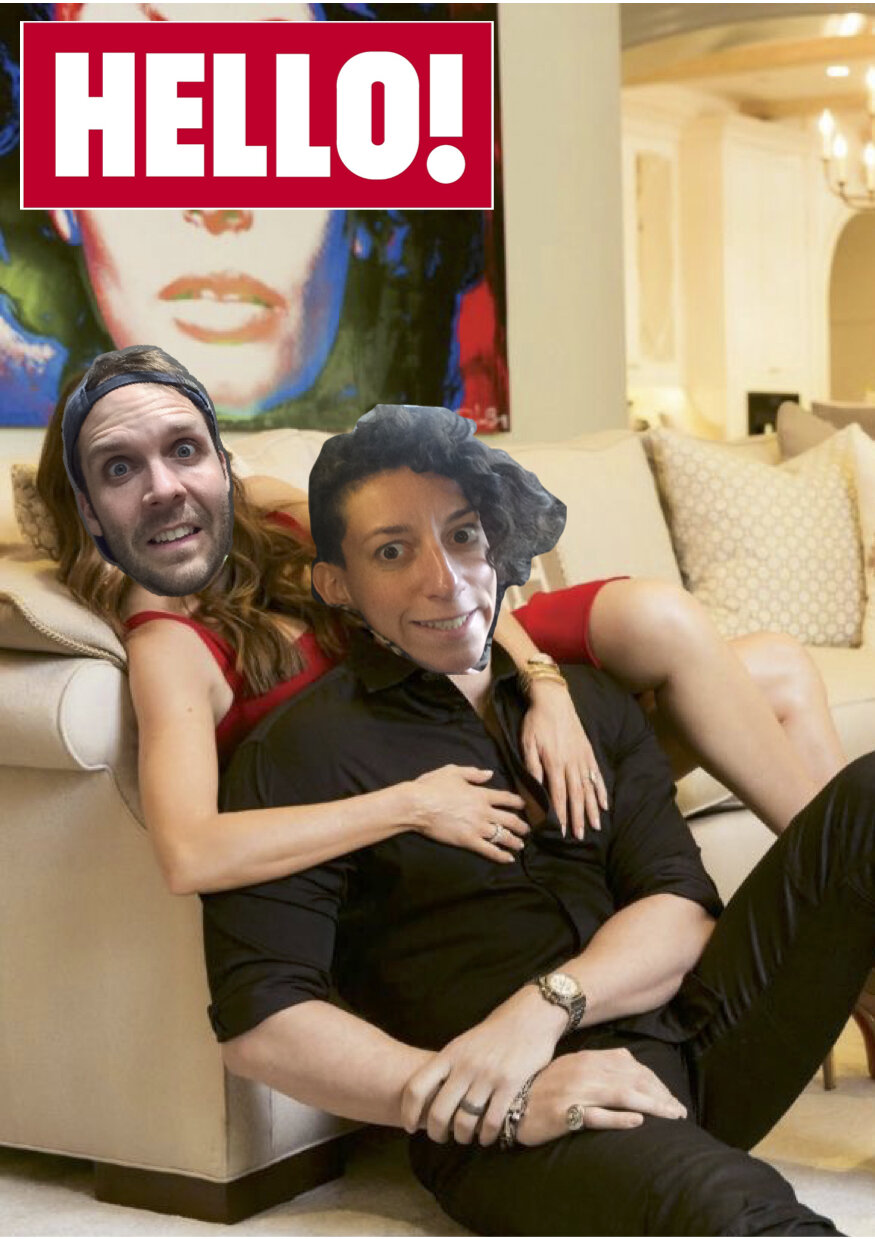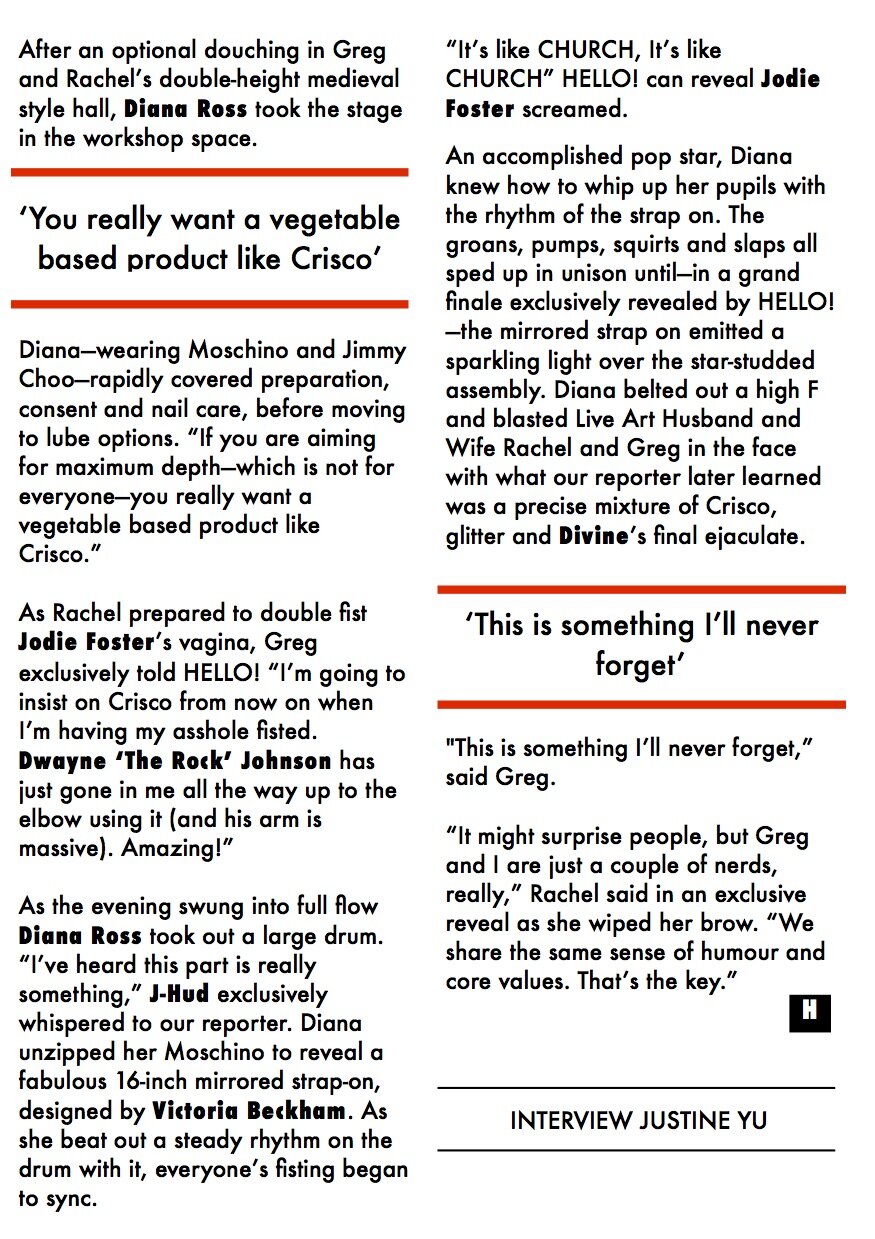On First Seeing 'Nanette'
This was a response to an invitation by Maddy Costa and Andy Field to talk about a performance that has been really important for me - for the launch of their book PERFORMANCE IN AN AGE OF PRECARITY
It is July 2017 and I am in a kitchen of a house on the banks of a loch which is a walk from a bus stop, which is a ferry ride from a train station, which is a train ride to Glasgow.
It is a LADA DIY project that Greg Wohead and I are running with Buzzcut, and we have taken over a big house with a group of artists.
I’ve fallen down the stairs the week before and fucked my ankle a bit and Greg has pretty much broken his wrist after falling on a hike just recently and so it’s been a bit tricky getting all the food from the Glasgow aldi onto the train and the ferry and the bus and the walk but we’ve made it.
We have ummed and ahhed about alcohol or no alcohol and phones or no phones and in the end we decide on yes alcohol and phones in a box.
We are drinking wine getting ready for dinner and I believe artist Vera Chok has just been sitting in the sink – not for art – just to recreate the ‘is the cat in the sink’ twitter feed.
Bron Batten is an artist who is visiting from Melbourne and she says she’s just seen this show, well, stand-up really at home and did I know it was coming to Edinburgh in August and I should see it so I write its name down.
It’s August 2017 now and it’s mid Edinburgh festival and all a bit much and I decide to go to see this show Bron has recommended on my own just to have some quiet time where you are invisible just watching the work. Just being an audience.
It’s in one of those incredibly awkward university rooms turned into a performance space – I’ve just checked – and it’s Assembly Rooms Studio 5 in George Square, a converted classroom with a capacity of 87. Very wide compared to its depth so the stage is incredibly thin. I’m sitting on the side of the front row so I’m basically watching the whole thing in profile.
I’ve heard of Hannah Gadsby before because comedy and gay but I’ve never seen her perform.
I’m talking about Nanette tonight and I’m talking about having seen it in a tiny audience before it was NANETTE and I realise there’s a risk that that makes me some kind of ‘I listened to them before they were famous’ cunt but I’ll take the risk.
The pre-show music is ‘Bobby Reid’ by Lucette which I will think is called ‘Blood in the Water’ until I check out the name of it for this, and it’s a kind of lolloping driving Americana folk that sounds classic but is actually from 2014 . The song actually only sings the lyric Blood in the Water once but that phrase gets stuck to this show in my mind.
The stage of the Assembly Rooms Studio 5 in George Square seems to have no cross through and Hannah Gadsby invisibily introduces herself and then appears from behind a curtain and I wonder if she’s been waiting there the whole time as the audience file in and I remember that feeling of needing to pee very badly just before you are about to go on and there being nowhere to go.
Then she starts talking and she’s very tall, and the room is not very high so she’s almost this giant on a matchbox stage. Also she’s just had dental work, she tells us, so she’s on painkillers that might run out during the show, so she’s touching her jaw a lot and pausing in winces of pain and it’s affecting her speech a bit.
For someone who likes to bang on about form a lot, it surprised me that this show is where I’ve ended up tonight. There are lots of ‘bigger’, more high concept theatrical shows I haven’t chosen to talk about. Gobsquad’s ‘Are you With Us’ at Spill Festival in 2014. Cassils’ ‘Becoming an Image’, A one-on-one ‘Exposure’ with Jo Bannon in a theatre cupboard in Contact Theatre, Manchester; an entire audience crying at ‘Fun Home’ at the Young Vic, She-Goat in mullets at CPT, Rachael Young peeling oranges at the Yard, any number of high-budget Belgian shows at the Barbican with their £20,000 worth of real pine forests.
Everytime I started thinking about writing about one of them instead this one kept quietly putting its hand up from the back.
Yes, I’m not flashy it says, I’m just talking. But I’m really good talking.
Hannah Gadby talks like someone firing a muffled machine gun, which sometimes sputters and dies out before refinding more bullets and going off again.
She mumbles bits- on purpose or because she’s got toothache and it makes you lean in to try and make out the words.
You’ve probably heard the words she said sometime , either that Edinburgh or in another room or on a screen since. We’re two months before Metoo is #Metoo and Hannah Gadsby is talking about white male fragility and Picasso and being misgendered and power and the pride flag being too loud and violence and where the quiet gays are and the ongoing damage of soaking children in shame and expecting them to just get on with it.
She talks about lesbians and the old days and she says:
Back then, in the good old days, lesbian meant something different than it does now. Back then, lesbian wasn’t about sexuality, a lesbian was just any woman not laughing at a man.
And I laugh and most of the other 86 people in the room laugh too.
Sometimes you see a show where someone just says, just explains really elegantly, in some magic new word order, a thing you really need to hear.
Listen, she says:
…do you understand what self-deprecation means when it comes from somebody who already exists in the margins? It’s not humility. It’s humiliation. I put myself down in order to speak, in order to seek permission… to speak. And I simply will not do that anymore. Not to myself or anybody who identifies with me.
I’m sitting at the very side on the front row looking at the extreme angle of her face as she says this, and suddenly I’m freezing cold.
Then she talks about jokes. About jokes being stories with the end lopped off because the truth mostly isn’t funny, or at least isn’t neat. She talks about jokes and about tension. About the shared air in the room and what she’s doing to it, what she’s been doing to it for years, and what that air does once it’s been deliberately sharpened, and the need to control the direction of the blade so it doesn’t slice up the wrong people or- no matter what you try - always end up slicing yourself.
It’s late afternoon in August 2017 and I’ve been trying to express these ideas to myself for ages. Or. Not even. Just holding a space for trying to express them. The potential and actual damage of comedy. Using forms that have been historically used against you without really thinking it through. The risk you are to yourself and your community and your audiences. The number of people who never think about the direction of the blade.
And then Hannah Gadsby says it, with careful rage in a too wide room out of a painful mouth.
Afterwards I go and sit on those awkward massive concrete stairs for a while and then I go to Summerhall and drink gin and tell people to go and see it.
This year long pause from going to shows.
Of course it’s the shows that are the thing.
But it’s also who told you about it. It’s who you went with, or didn’t, and where you had been just before and what you did immediately afterwards, and who you rushed to tell .
It’s the conversations afterwards that push on the interrogation of the show into the future, into other, future work. It’s what it did to your insides.
I don’t joke so much, or so carelessly, anymore. Not on stage and not off it either.
I’ve got language for myself about why that is.
I’m thankful to Nanette for that.












